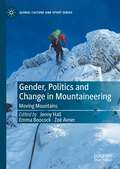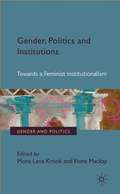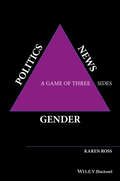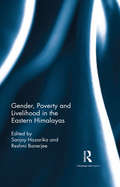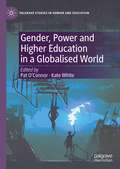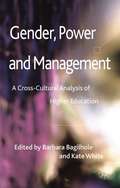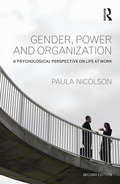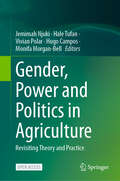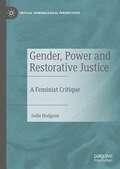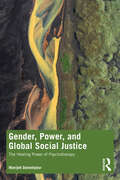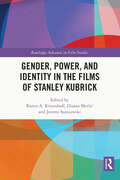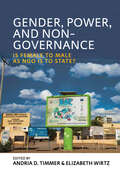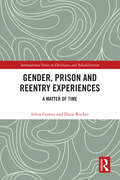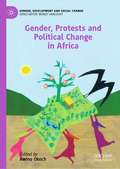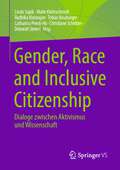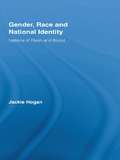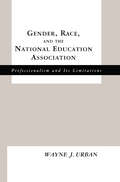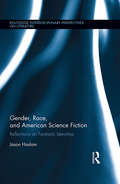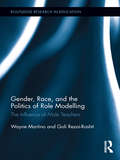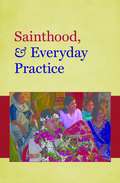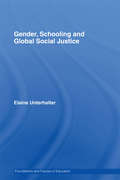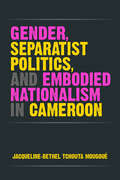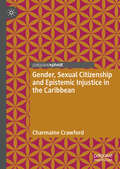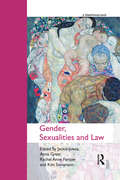- Table View
- List View
Gender, Politics and Change in Mountaineering: Moving Mountains (Global Culture and Sport Series)
by Jenny Hall Emma Boocock Zoë AvnerThis book is the first edited collection to offer an intersectional account of gender in mountaineering adventure sports and leisure. It provides original theoretical, methodological, and empirical insights into mountain spaces as sites of socio-cultural production and transformation. The book shows how gender matters in the twenty-first century, and illustrates that there is a need for greater efforts to mainstream difference in representations and governance structures if we are to improve equality in adventure, sporting and leisure spaces. The interdisciplinary volume represents scholars from theoretical as well as applied perspectives across adventure, tourism, sport science, sports coaching, psychology, geography, sociology and outdoor studies.
Gender, Politics and Institutions
by Mona Lena Krook Fiona MackayPolitical institutions profoundly shape political life and are also gendered. This groundbreaking collection synthesises new institutionalism and gendered analysis using a new approach - feminist institutionalism - in order to answer crucial questions about power inequalities, mechanisms of continuity, and the gendered limits of change.
Gender, Politics and Society in Ukraine
by Olena Hankivsky Anastasiya SalnykovaGender, Politics, and Society in Ukraine is the first collection to examine how political, social, and economic transitions in post-Communist Ukraine are transforming gender roles and relations within the country. Leading Western and Ukrainian scholars and practitioners address a wide range of effects associated with and reinforced by these transitions - including the breakdown of the general welfare system, the lack of progress in the development of the healthcare system, gender inequality in political representation, the patriarchal nature of nation building, human trafficking, domestic violence, changing conceptions of fatherhood and masculinity, homelessness, and LGBT issues - from a variety of methodological and disciplinary perspectives.Gender, Politics, and Society in Ukraine is particularly innovative in its exploration of both women's and men's experiences and the ways in which gender relations shift over time in societies undergoing transitions to democracy. As such, this volume furthers the understanding of the complex obstacles and challenges of working towards gender equality in evolving democracies and identifies future priorities for research, politics, and policy development.
Gender, Politics, News: A Game of Three Sides
by Karen RossGender, Politics, News: A Game of Three Sides explores the role of gender in the broader processes of political communication The only contemporary book focusing on the relationships between gender, politics, and news media which takes a global perspective An analysis of political journalism as a practice and the development of the field in terms of gendered workplace cultures Offers a solid framework for understanding women’s political representation, including real world case studies of women’s campaigns for the top political job across a range of different geographies and contexts Coverage of hot-button issues, such as political scandal and the role of new and social media in politics and elections, makes this a highly relevant and current work with resonances for a wide audience
Gender, Poverty and Livelihood in the Eastern Himalayas
by Sanjoy Hazarika Reshmi BanerjeeThe Eastern Himalaya region covers a geographical area that spans five nations and has diverse landscapes, a multitude of ethnic groups and a rich variety of flora and fauna. The region is relatively poor in terms of GDP and per capita income; industrialisation and infrastructure is under-developed; climate-induced disasters are frequent; and maternal and infant mortality rates are high. Economic constraints combined with restrictive cultural norms create barriers for women in education, employment and decision-making, thus further entrenching unequal gender relations. This book explores the ways in which gender-sensitive and inclusive policies can be developed to address the basic issues of marginalisation, livelihood, poverty and vulnerability in the Eastern Himalayas. The chapters in the volume touch upon current concerns, such as the economic and social challenges faced by women, their control over resources, questions of patriarchy, discrimination, gender rights and equity, information, empowerment and participation, and women as agents of change. This volume will be useful to researchers and scholars in gender studies, sociology and social anthropology, development studies, economic and human geography, politics, northeast and Himalayan studies, South Asian studies, as well as policymakers and those in the development sector and non-governmental organisations.
Gender, Power and Higher Education in a Globalised World (Palgrave Studies in Gender and Education)
by Kate White Pat O’ConnorThis book examines persistent gender inequality in higher education, and asks what is preventing change from occurring. The editors and contributors argue that organizational resistance to gender equality is the key explanation; reflected in the endorsement of discourses such as excellence, choice, distorted intersectionality, revitalized biological essentialism and gender neutrality. These discourses implicitly and explicitly depict the status quo as appropriate, reasonable and fair: ultimately impeding efforts and attempts to promote gender equality. Drawing on research from around the world, this book explores the limits and possibilities of challenging these harmful discourses, focusing on the state and universities themselves as levers for change. It stresses the importance of institutional transformation, the vital contribution of feminist activists and the importance of women’s deceptively ‘small victories’ in the academy.
Gender, Power and Management
by Kate White Barbara BagilholeWomen are now part of senior management in higher education (HE) to varying degrees in most countries and actively contribute to the vision and strategic direction of universities. This book attempts to analyse their impact and potential impact on both organisational growth and culture
Gender, Power and Organization: A psychological perspective on life at work
by Paula NicolsonWork organizations are a major site of gender politics for professional women and men, and although there are more women in senior positions than ever before, these increased opportunities have not been gained without psychological consequences. Evidence-based and theoretically driven, the new edition of Gender, Power and Organization raises important questions about gender and power in the workplace, and the psychology of women’s advancement. Twenty years on from the first edition, it re-examines gender relations at work and asks why, despite many years of feminist critique and action, we are able to understand the dynamics of the workplace but fail to make them more representative. The struggles women face in professional and public life remain intense, not least because many men experience an increasing sense of threat to their long-term aspirations and professional positions. Using examples from recent research and the author's own consultancy experience, this important volume offers a fresh exploration of the psychology of gender and power at work, from the development of gender identities and roles, to explanations of bullying and sexual harassment in the organization. It offers an accessible survey of the subject for professional managers and students of leadership, psychology, management, sociology, gender, and women’s studies.
Gender, Power and Politics in Agriculture: Revisiting Theory and Practice
by Hugo Campos Jemimah Njuki Vivian Polar Hale Ann Tufan Monifa Morgan-BellThis is a open access book. In the agriculture sector, the language of gender integration often ignores the politics and the power dynamics that are central to critical, and feminist, analysis of gender relations. This volume explores largely neglected topics such as power dynamics, masculinities, gendered social norms, feminist research practice, intersectionality, critical analysis of tools and more, that are fundamental to shifting the entrenched power dynamics and politics of gender research in agriculture. The purpose of this book is to reduce the gap existing between theory, methods, and practice of gender relations in agriculture and agricultural research. Through an in-depth analysis of current processes in agriculture and drawing on existing experiences in other sectors, it seeks to create pathways for learning, catalyzing change and positive impact on gender equity and social inclusion. This volume seeks to bring forth a change in how gender relations in agriculture are researched, practiced and taught.
Gender, Power and Restorative Justice: A Feminist Critique (Critical Criminological Perspectives)
by Jodie HodgsonThis book ties restorative justice into the exercise of patriarchal power. It is focused on the individual narratives of 15 girls and young women who have participated in a victim-offender restorative justice (RJ) conference and the perspectives of youth justice practitioners. Gender, Power and Restorative Justice expands feminist engagement with RJ by focusing critical attention on the importance of the social construction of gender, the exercise of power, shame, stigma, muting and resistance to girls’ experiences of RJ conferencing. Drawing upon recent developments to the sociology of stigma and feminist perspectives on shame, the book contends that RJ conferencing can produce harmful implications for girls and young women who participate. Ultimately it is argued that anti-carceral, social policy alternatives, underpinned by feminist praxis, should replace a youth justice jurisprudence for girls. This book will be of particular use and interest to those studying modules on criminology, youth justice, criminal justice and social work courses.
Gender, Power, and Global Social Justice: The Healing Power of Psychotherapy
by Manijeh DaneshpourThis book analyses how practitioners can use psychotherapy as a healing mechanism, focusing on the intersection of gender, power, and social justice within the global context. It begins by interrogating the concept of social justice itself before examining men's and women’s issues from biological, sociological, contextual, and ecological perspectives. Each chapter covers individual, couple, and family therapy as well as training and supervising for heterosexual and homosexual individuals from a social justice standpoint. With a centered and balanced perspective about the impact of gender and power on men's and women's relationships to each other and their ecological contexts, Daneshpour aims to help mental health practitioners privilege client voices, promote justice in gendered relationships, and manage the impact of socio-political issues in therapeutic practice.
Gender, Power, and Identity in The Films of Stanley Kubrick (Routledge Advances in Film Studies)
by Jeremi Szaniawski Karen A. Ritzenhoff Dijana MetlićThis volume features a set of thought-provoking and long overdue approaches to situating Stanley Kubrick’s films in contemporary debates around gender, race, and age – with a focus on women’s representations. Offering new historical and critical perspectives on Kubrick’s cinema, the book asks how his work should be viewed bearing in mind issues of gender equality, sexual harassment, and abuse. The authors tackle issues such as Kubrick’s at times questionable relationships with his actresses and former wives, the dynamics of power, misogyny and miscegenation in his films, and auteur ‘apologism’, among others. The selection delineates these complex contours of Kubrick’s work by drawing on archival sources, engaging in close readings of specific films, and exploring Kubrick through unorthodox venture points. With an interdisciplinary scope and social justice-centered focus, this book offers new perspectives on a well-established area of study. It will appeal to scholars and upper-level students of film studies, media studies, gender studies, and visual culture, as well as to fans of the director interested in revisiting his work with a new perspective.
Gender, Power, and Non-Governance: Is Female to Male as NGO Is to State?
by Andria D. Timmer and Elizabeth WirtzUsing Sherry Ortner’s analogy of Female/Nature, Male/Culture, this volume interrogates the gendered aspects of governance by exploring the NGO/State relationship. By examining how NGOs/States perform gendered roles and actions and the gendered divisions of labor involved in different types of institutional engagement, this volume attends to the ways in which gender and governance constitute flexible, relational, and contingent systems of power. The chapters in this volume present diverse analyses of the ways in which projects of governance both reproduce and challenge binaries.
Gender, Prison and Reentry Experiences: A Matter of Time (International Series on Desistance and Rehabilitation)
by Silvia Gomes Dixie RockerThis book explores the unique reentry experiences of incarcerated men and women who are about to be released from prisons in Portugal. By analysing gendered reentry experiences through the narratives of men and women, Gender, Prison and Reentry Experiences sheds light on current practices and strategies adopted in prisons regarding reentry and examines the structural, institutional, and personal barriers that infl uence the reentry outcome.Gender, Prison and Reentry Experiences examines the narratives built around an individual’s prison experiences, their perception of the prison’s impact on reentry, and their expectations after release. It reveals how men and women narrate and attribute meaning to their time in prison and how they navigate their ‘prisoner’ and ‘gendered’ identities. In doing so, this book demonstrates the importance of these identities in relation to recidivism and desistance, while also questioning the role incarceration has in further criminalising and obstructing an individual’s reentry process. It puts forward recommendations that aim to improve the lives of all incarcerated individuals within the current system, in addition to advocating for decarceration and prison abolition. It presents a novel contribution to the internationalisation of knowledge across multiple disciplinary subfi elds, namely critical reentry studies and feminist criminology, fi lling a gap in the current knowledge as few studies focus on prison experiences as a core aspect of understanding the reentry process.An accessible and compelling read, this book will appeal to students and scholars of criminology, sociology, law, desistance studies, and those interested in gaining a unique insight into the experience of incarcerated individuals.
Gender, Protests and Political Change in Africa (Gender, Development and Social Change)
by Awino OkechThis book brings together conceptual debates on the impact of youth-hood and gender on state building in Africa. It offers contemporary and interdisciplinary analyses on the role of protests as an alternative route for citizens to challenge the ballot box as the only legitimate means of ensuring freedom. Drawing on case studies from seven African countries, the contributors focus on specific political moments in their respective countries to offer insights into how the state/society social contract is contested through informal channels, and how political power functions to counteract citizen’s voices. These contributions offer a different way of thinking about state-building and structural change that goes beyond the system-based approaches that dominate scholarship on democratization and political structures. In effect, it provides a basis for organizers and social movements to consider how to build solidarity beyond influencing government institutions.
Gender, Race and Inclusive Citizenship: Dialoge zwischen Aktivismus und Wissenschaft
by Linda Supik Malte Kleinschmidt Radhika Natarajan Catharina Peeck-Ho Tobias Neuburger Christiane Schröder Deborah SielertDer zweisprachige Band untersucht Kämpfe und Regimes der Zugehörigkeit und diskutiert „Inclusive Citizenship“ in Originalbeiträgen und Konversationen von internationalen Forscher*innen und Aktivist*innen. Im Spannungsfeld von Acts und Regimes of Citizenship stellen sich hochpolitische Fragen der Agency zu Bewegungsfreiheit, digitalen Rechten, Zugehörigkeit zum städtischen Raum, Care und Sprache. Wir diskutieren diese im lokalen, regionalen, digitalen oder (trans-)nationalen Raum zu aktuellen Migrationsbewegungen nach und in Europa, rassismuskritischem und (queer-)feministischem Aktivismus gegen institutionelle und Alltagsdiskriminierung in ungleichen Gesellschaften.The bilingual volume examines struggles and regimes of belonging and discusses "inclusive citizenship" in original contributions and conversations by international researchers and activists. Between acts and regimes of citizenship, highly political questions of agency emerge about freedom of movement, digital rights, belonging to urban space, care, and language. We discuss these in local, regional, digital or (trans-)national space regarding current migration movements to and in Europe, and critical racism and (queer-)feminist activism against institutional and everyday discrimination in unequal societies.
Gender, Race and National Identity: Nations of Flesh and Blood (Routledge Research in Gender and Society #Vol. 17)
by Jackie HoganAll nations construct stories of national belonging, stories of the nation’s character, its accomplishments, its defining traits, its historical trajectory. These stories, or discourses of national identity, carry powerful messages about gender and race, messages that reflect, reproduce and occasionally challenge social hierarchies. Gender, Race and National Identity examines links between gender, race and national identity in the US, UK, Australia and Japan. The book takes an innovative approach to national identity by analyzing a range of ephemeral and pop cultural texts, from Olympic opening ceremonies, to television advertisements, letters to the editor, broadsheet war coverage, travel brochures, museums and living history tourist venues. Its rich empirical detail and systematic cross-national comparisons allow for a fuller theorization of national identity.
Gender, Race and the National Education Association: Professionalism and its Limitations (Studies in the History of Education)
by Wayne J. UrbanUrban presents the NEA in its historical context, turning a fair and clear eye on this powerful and controversial organization, and using this context to both criticize and commend. The culmination of a three decade long study, this unique volume presents an unusually thorough and much needed holistic view of the NEA.
Gender, Race, and American Science Fiction: Reflections on Fantastic Identities (Routledge Interdisciplinary Perspectives on Literature)
by Jason HaslamThis book focuses on the interplay of gender, race, and their representation in American science fiction, from the nineteenth-century through to the twenty-first, and across a number of forms including literature and film. Haslam explores the reasons why SF provides such a rich medium for both the preservation of and challenges to dominant mythologies of gender and race. Defining SF linguistically and culturally, the study argues that this mode is not only able to illuminate the cultural and social histories of gender and race, but so too can it intervene in those histories, and highlight the ruptures present within them. The volume moves between material history and the linguistic nature of SF fantasies, from the specifics of race and gender at different points in American history to larger analyses of the socio-cultural functions of such identity categories. SF has already become central to discussions of humanity in the global capitalist age, and is increasingly the focus of feminist and critical race studies; in combining these earlier approaches, this book goes further, to demonstrate why SF must become central to our discussions of identity writ large, of the possibilities and failings of the human —past, present, and future. Focusing on the interplay of whiteness and its various 'others' in relation to competing gender constructs, chapters analyze works by Nathaniel Hawthorne, Mary E. Bradley Lane, Edgar Rice Burroughs, Philip Francis Nowlan, George S. Schuyler and the Wachowskis, Frank Herbert, William Gibson, and Octavia Butler. Academics and students interested in the study of Science Fiction, American literature and culture, and Whiteness Studies, as well as those engaged in critical gender and race studies, will find this volume invaluable.
Gender, Race, and the Politics of Role Modelling: The Influence of Male Teachers (Routledge Research in Education)
by Wayne Martino Goli Rezai-RashtiThis book provides an illuminating account of teachers’ own reflections on their experiences of teaching in urban schools. It was conceived as a direct response to policy-related and media-generated concerns about male teacher shortage and offers a critique of the call for more male role models in elementary schools to address important issues regarding gender, race and the politics of representation. By including the perspectives of minority teachers and students, and by drawing on feminist, queer and anti-racist frameworks, this book rejects the familiar tendency to resort to role modelling as a basis for explaining or addressing boys’ disaffection with schooling. Indeed, the authors argue, on the basis of their research in urban schools in Canada and Australia, that educational policy concerned with male teacher shortage and the plight of disadvantaged minority boys would benefit from engaging with analytic perspectives and empirical literature that takes readers beyond hegemonic discourses of role modelling. A compelling case is presented for the need to disarticulate discourses about role modelling from a politics of representation that is committed to addressing the reality of the impact of racial and structural inequalities on both minority teachers and students’ participation in the education system. The book also provides insight into the persistence of gender inequality as it relates to the status of elementary school teaching as women’s work.
Gender, Sainthood, and Everyday Practice in South Asian Shi’ism
by Karen G. RuffleIn this study of devotional hagiographical texts and contemporary ritual performances of the Shi'a of Hyderabad, India, Karen Ruffle demonstrates how traditions of sainthood and localized cultural values shape gender roles. Ruffle focuses on the annual mourning assemblies held on 7 Muharram to commemorate the battlefield wedding of Fatimah Kubra and her warrior-bridegroom Qasem, who was martyred in 680 C.E. at the battle of Karbala, Iraq, before their marriage was consummated.Ruffle argues that hagiography, an important textual tradition in Islam, plays a dynamic role in constructing the memory, piety, and social sensibilities of a Shi'i community. Through the Hyderabadi rituals that idealize and venerate Qasem, Fatimah Kubra, and the other heroes of Karbala, a distinct form of sainthood is produced. These saints, Ruffle explains, serve as socioethical role models and religious paragons whom Shi'i Muslims aim to imitate in their everyday lives, improving their personal religious practice and social selves. On a broader community level, Ruffle observes, such practices help generate and reinforce group identity, shared ethics, and gendered sensibilities. By putting gender and everyday practice at the center of her study, Ruffle challenges Shi'i patriarchal narratives that present only men as saints and brings to light typically overlooked women's religious practices.
Gender, Schooling and Global Social Justice (Foundations and Futures of Education)
by Elaine UnterhalterTimely and original, this book examines gender equality in schooling as an aspiration of global social justice. With nearly one billion people having little or no schooling and women and girls comprising nearly two-thirds of this total, this book analyses the historical, sociological, political and philosophical issues involved as well as exploring actions taken by governments, Inter-Government Organisations, NGOs and women’s groups since 1990 to combat this injustice. Written by a recognised expert in this field, the book is organised clearly into three parts: the first provides a background to the history of the provision of schooling for girls worldwide since 1945 and locates the challenges of gender inequality in education the second examines different views as to why questions of gender and schooling should be addressed globally, contrasting arguments based on human capital theory, rights and capabilities the third analyses how governments, Inter-Government Organisations and NGOs have put policy into practice. Addressing the urgent global challenges in gender and schooling, this book calls for a new connected approach in policy and practice. It is essential reading for all those interested in education, along with developmental studies, sociology, politics and women’s studies.
Gender, Separatist Politics, and Embodied Nationalism in Cameroon (African Perspectives)
by Jacqueline-Bethel Tchouta MougouéGender, Separatist Politics, and Embodied Nationalism in Cameroon illuminates how issues of ideal womanhood shaped the Anglophone Cameroonian nationalist movement in the first decade of independence in Cameroon, a west-central African country. Drawing upon history, political science, gender studies, and feminist epistemologies, the book examines how formally educated women sought to protect the cultural values and the self-determination of the Anglophone Cameroonian state as Francophone Cameroon prepared to dismantle the federal republic. The book defines and uses the concept of embodied nationalism to illustrate the political importance of women’s everyday behavior—the clothes they wore, the foods they cooked, whether they gossiped, and their deference to their husbands. The result, in this fascinating approach, reveals that West Cameroon, which included English-speaking areas, was a progressive and autonomous nation. The author’s sources include oral interviews and archival records such as women’s newspaper advice columns, Cameroon’s first cooking book, and the first novel published by an Anglophone Cameroonian woman.
Gender, Sexual Citizenship and Epistemic Injustice in the Caribbean
by Charmaine CrawfordThis book interrogates the relationship between gender, sexual citizenship and epistemic injustice as it relates to the experiences of LGBTQ persons in the Commonwealth Caribbean. Whether it is the recognition of gender/sexual identities, sexual freedom, bodily autonomy, marriage or creating a family, sexual citizenship encompasses different aspects of our intimate lives that have erotic, social, and economic value that are organised and legitimised through the family, religion, law, state, family, and civil society. Employing decolonial feminist queer perspectives, this book considers how race, gender, and sexuality intersect through matrices of power in shaping intimate life in giving more rights and freedoms to some over others. While Caribbean sexualities are rich and diverse, there still exists dominant colonial and post-colonial heteropatriarchal ideologies and practices that infringe on the sexual rights of Caribbean LGBTQ persons normalising discriminatory treatment (homophobia, lesbophobia and transphobia) against them. Despite efforts to silence Caribbean LGBTQ persons, they have politicised their cause by engaging in epistemic resistance. Caribbean LGBTQ activism encompasses a myriad of social justice efforts, incorporating intersectional politics with feminists and other groups, which validate queer identities, knowledges and lives in the region and diaspora. This book showcases how Caribbean LGBTQ activists are using strategic litigation anchored in social justice hermeneutics to upend vagrancy and anti-buggery laws, which has led to successful decriminalisation cases in the region. This book will interest researchers and students in women’s, gender, and sexuality studies and Caribbean studies.
Gender, Sexualities and Law
by Kim Stevenson Jackie Jones Anna Grear Rachel Anne FentonBringing together an international range of academics, Gender, Sexualities and Law provides a comprehensive interrogation of the range of contemporary issues – both topical and controversial – raised by the gendered character of law, legal discourse and institutions. The gendering of law, persons and the legal profession, along with the gender bias of legal outcomes, has been a fractious, but fertile, focus of reflection. It has, moreover, been an important site of political struggle. This collection of essays offers an unrivalled examination of its various contemporary dimensions, focusing on: issues of theory and representation; violence, both national and international; reproduction and parenting; and partnership, sexuality, marriage and the family. Gender, Sexualities and Law will be invaluable for all those engaged in research and study of the law (and related fields) as a form of gendered power.
